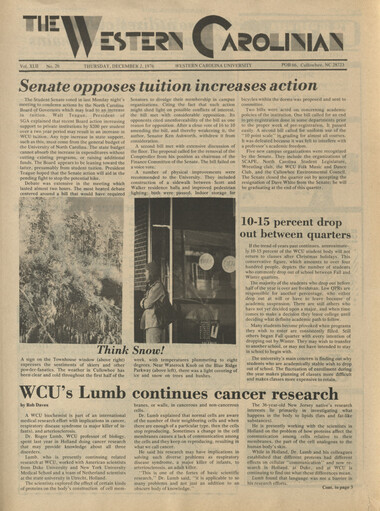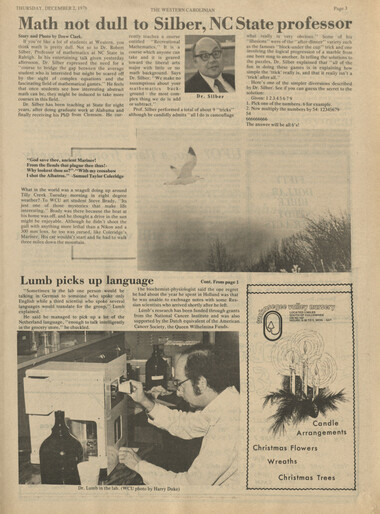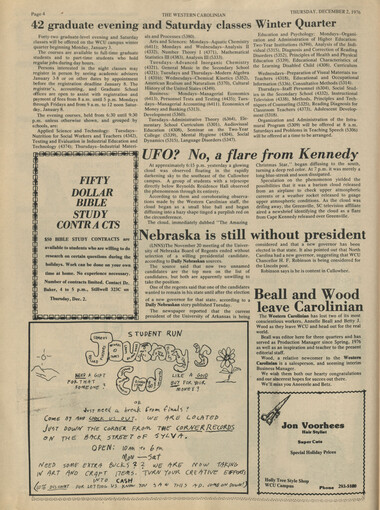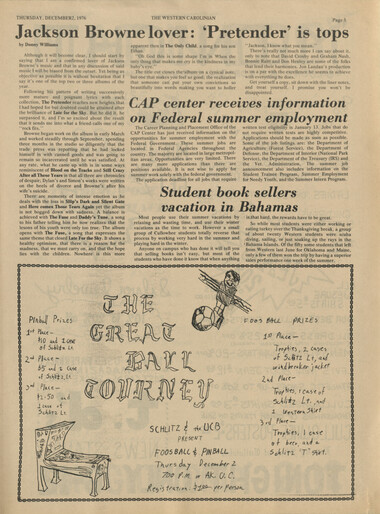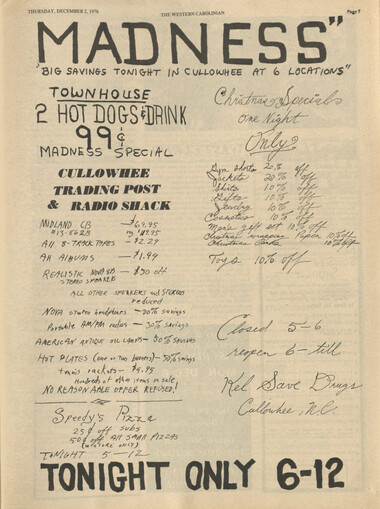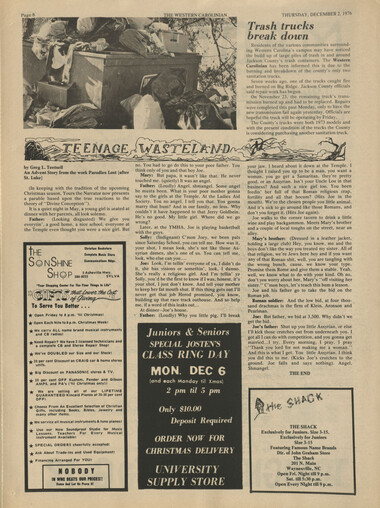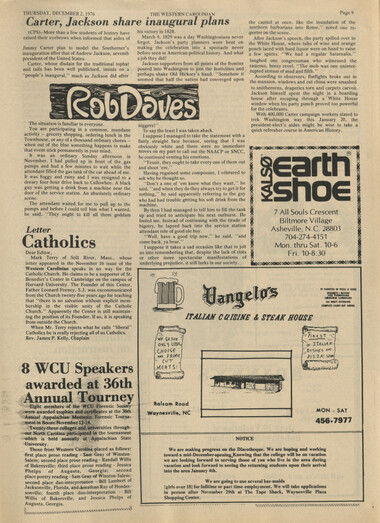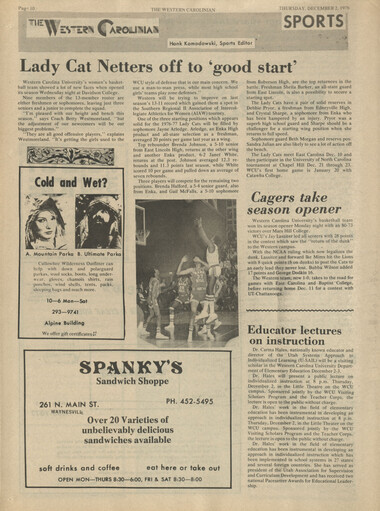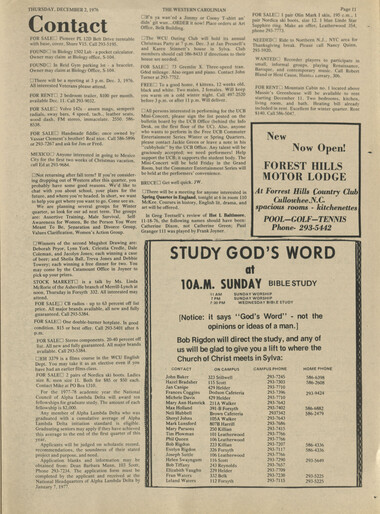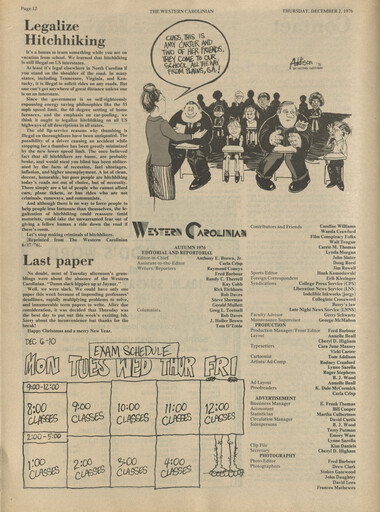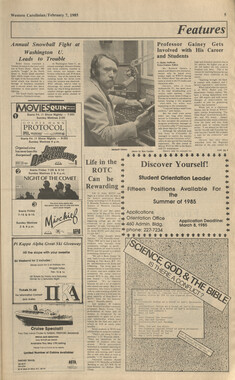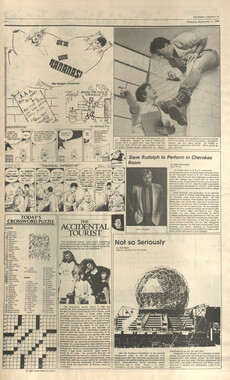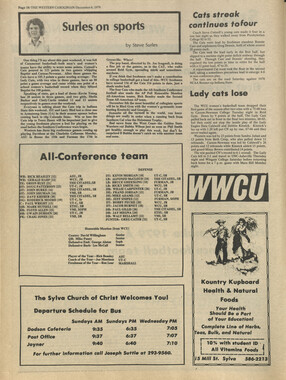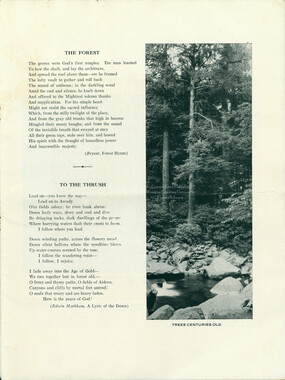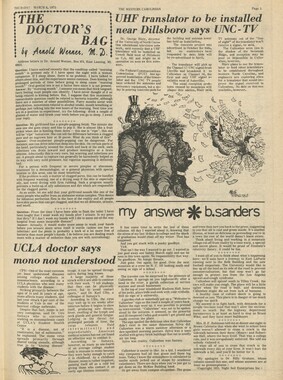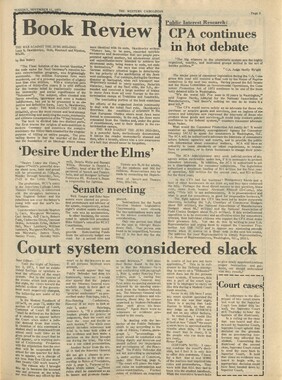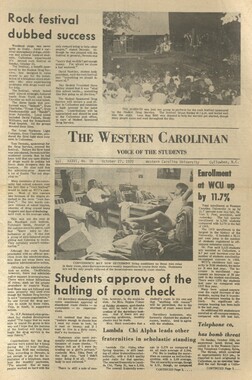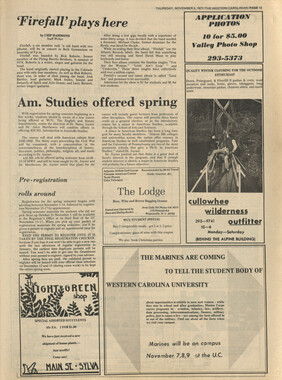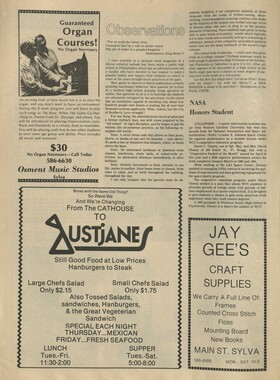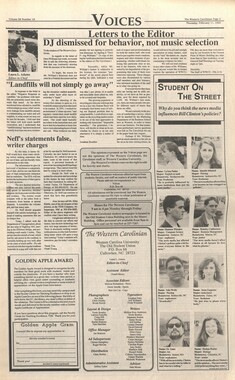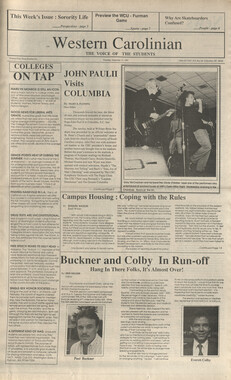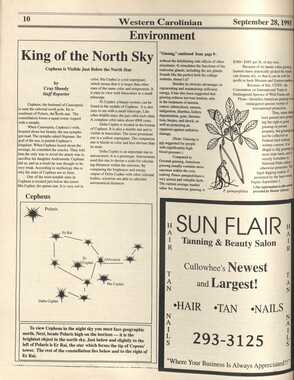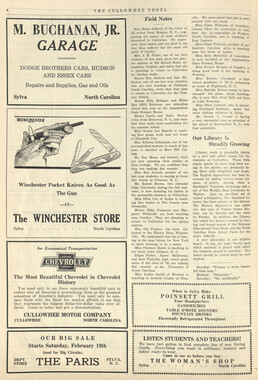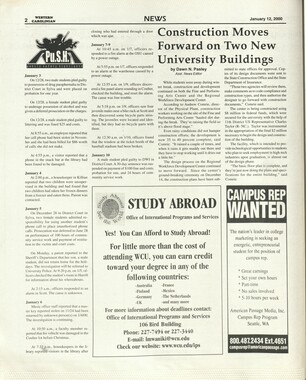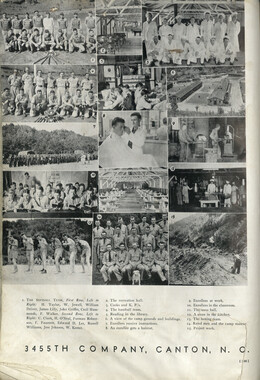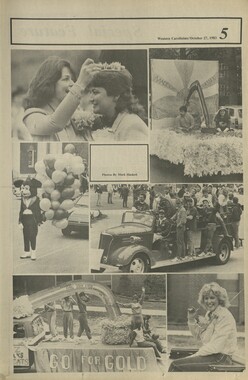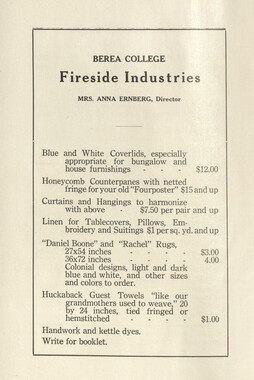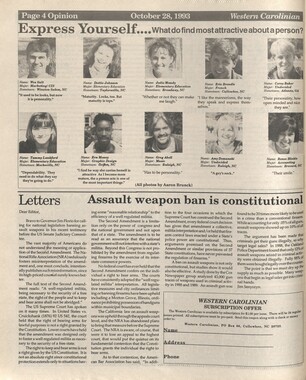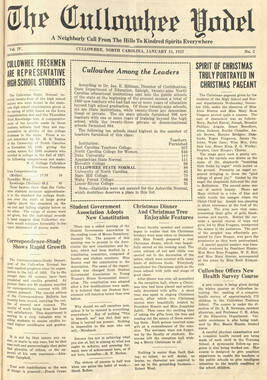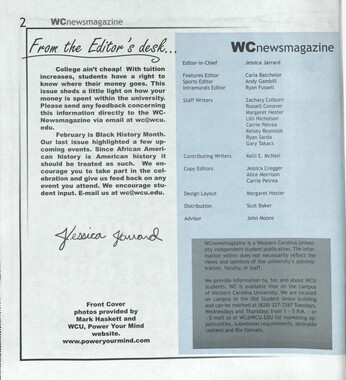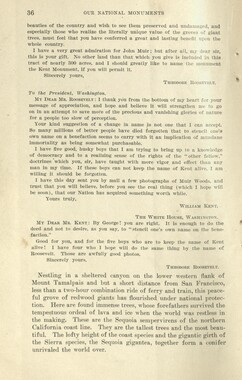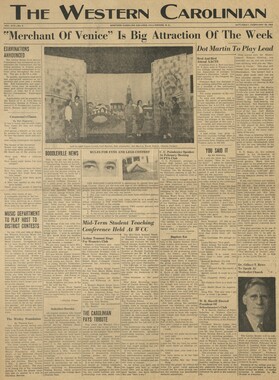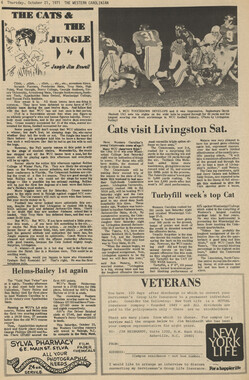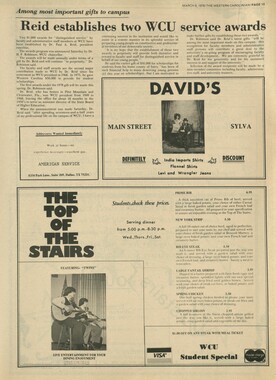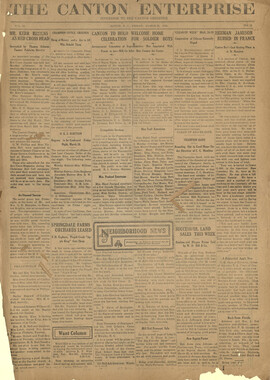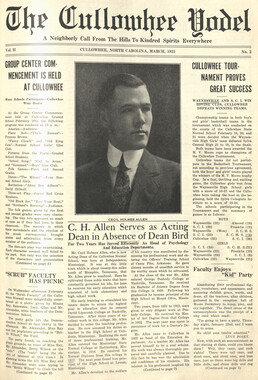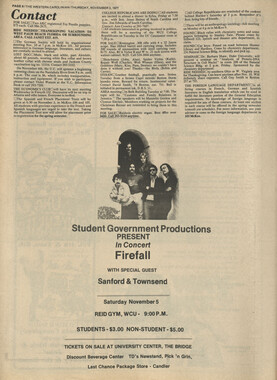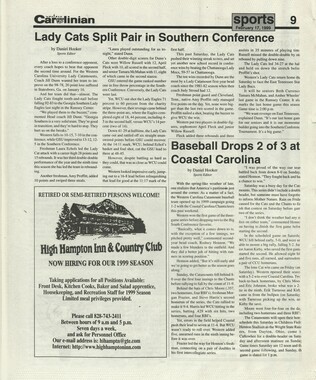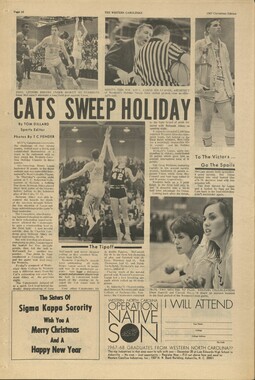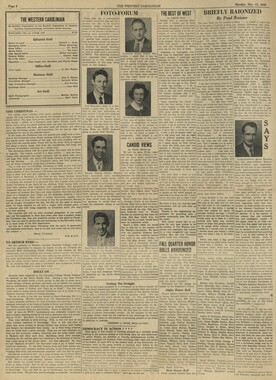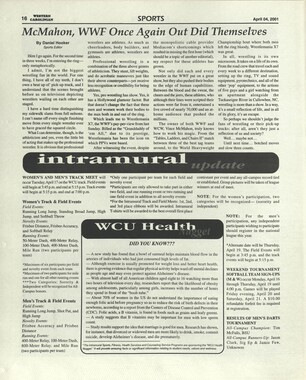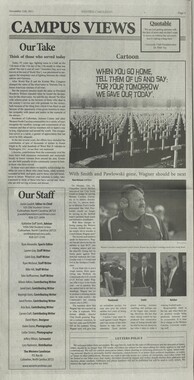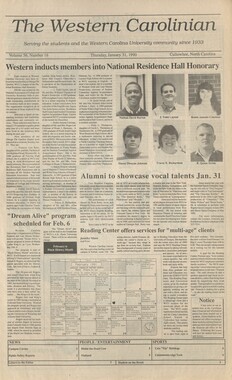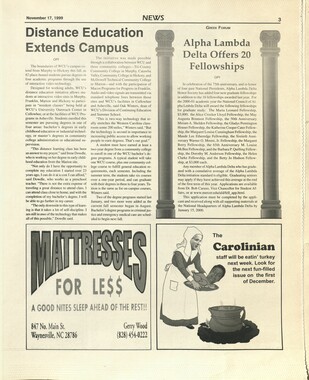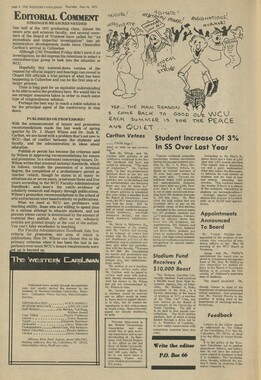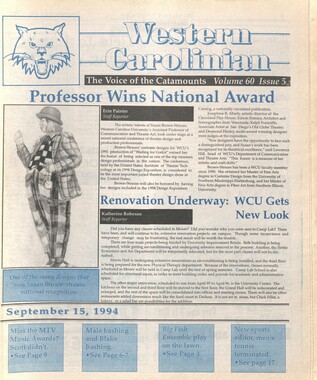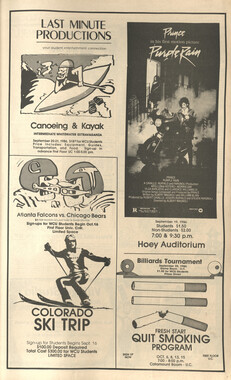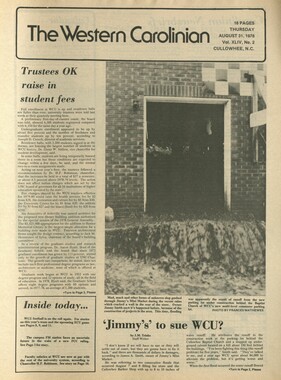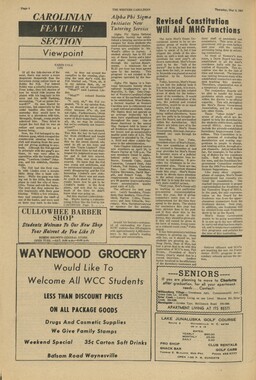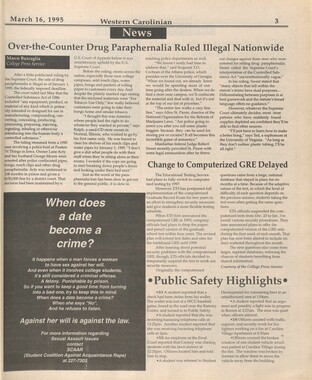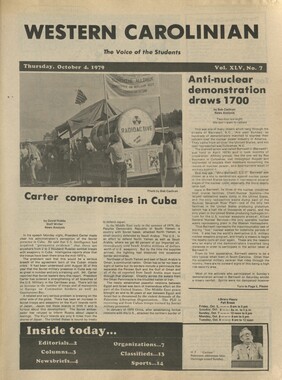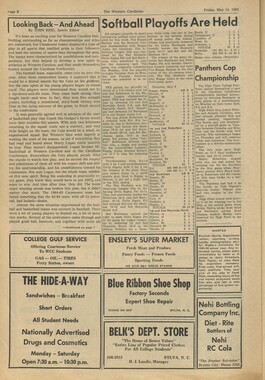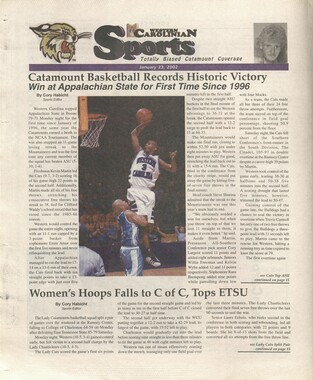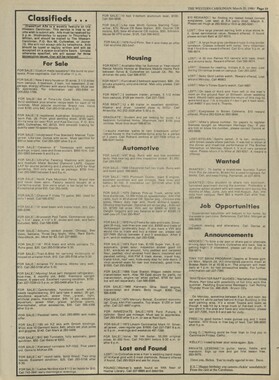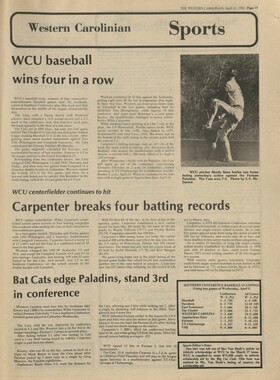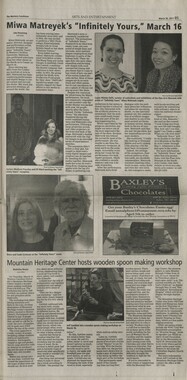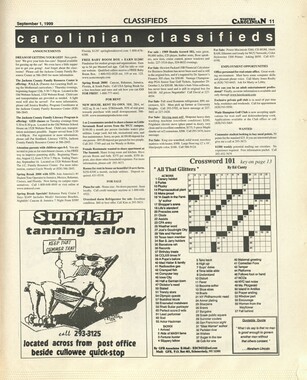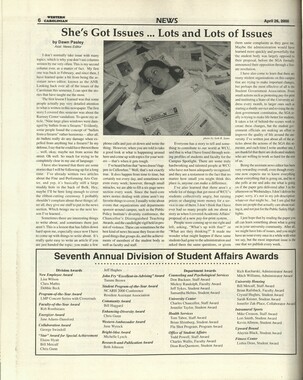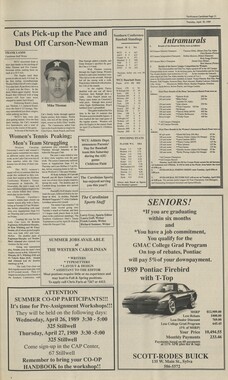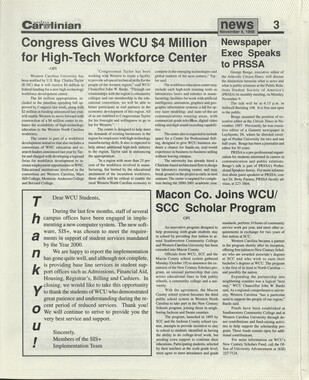Western Carolina University (21)
View all
- Canton Champion Fibre Company (2308)
- Cherokee Traditions (291)
- Civil War in Southern Appalachia (165)
- Craft Revival (1942)
- George Masa Collection (137)
- Great Smoky Mountains - A Park for America (3080)
- Highlights from Western Carolina University (422)
- Horace Kephart (998)
- Journeys Through Jackson (159)
- LGBTQIA+ Archive of Jackson County (89)
- Oral Histories of Western North Carolina (318)
- Picturing Appalachia (6617)
- Stories of Mountain Folk (413)
- Travel Western North Carolina (153)
- Western Carolina University Fine Art Museum Vitreograph Collection (129)
- Western Carolina University Herbarium (92)
- Western Carolina University: Making Memories (738)
- Western Carolina University Publications (2491)
- Western Carolina University Restricted Electronic Theses and Dissertations (146)
- Western North Carolina Regional Maps (71)
- World War II in Southern Appalachia (131)
University of North Carolina Asheville (6)
View all
- Allanstand Cottage Industries (62)
- Appalachian National Park Association (53)
- Bennett, Kelly, 1890-1974 (1463)
- Berry, Walter (76)
- Brasstown Carvers (40)
- Carver, George Washington, 1864?-1943 (26)
- Cathey, Joseph, 1803-1874 (1)
- Champion Fibre Company (233)
- Champion Paper and Fibre Company (297)
- Cherokee Indian Fair Association (16)
- Cherokee Language Program (22)
- Crowe, Amanda (40)
- Edmonston, Thomas Benton, 1842-1907 (7)
- Ensley, A. L. (Abraham Lincoln), 1865-1948 (275)
- Fromer, Irving Rhodes, 1913-1994 (70)
- George Butz (BFS 1907) (46)
- Goodrich, Frances Louisa (120)
- Grant, George Alexander, 1891-1964 (96)
- Heard, Marian Gladys (60)
- Kephart, Calvin, 1883-1969 (15)
- Kephart, Horace, 1862-1931 (313)
- Kephart, Laura, 1862-1954 (91)
- Laney, Gideon Thomas, 1889-1976 (439)
- Masa, George, 1881-1933 (61)
- McElhinney, William Julian, 1896-1953 (44)
- Niggli, Josephina, 1910-1983 (10)
- North Carolina Park Commission (105)
- Osborne, Kezia Stradley (9)
- Owens, Samuel Robert, 1918-1995 (11)
- Penland Weavers and Potters (36)
- Roberts, Vivienne (15)
- Roth, Albert, 1890-1974 (142)
- Schenck, Carl Alwin, 1868-1955 (1)
- Sherrill's Photography Studio (2565)
- Southern Highland Handicraft Guild (127)
- Southern Highlanders, Inc. (71)
- Stalcup, Jesse Bryson (46)
- Stearns, I. K. (213)
- Thompson, James Edward, 1880-1976 (226)
- United States. Indian Arts and Crafts Board (130)
- USFS (683)
- Vance, Zebulon Baird, 1830-1894 (1)
- Weaver, Zebulon, 1872-1948 (58)
- Western Carolina College (230)
- Western Carolina Teachers College (282)
- Western Carolina University (2008)
- Western Carolina University. Mountain Heritage Center (18)
- Whitman, Walt, 1819-1892 (10)
- Wilburn, Hiram Coleman, 1880-1967 (73)
- Williams, Isadora (3)
- Cain, Doreyl Ammons (0)
- Crittenden, Lorraine (0)
- Rhodes, Judy (0)
- Smith, Edward Clark (0)
- Appalachian Region, Southern (3032)
- Asheville (N.C.) (1945)
- Avery County (N.C.) (26)
- Blount County (Tenn.) (195)
- Buncombe County (N.C.) (1680)
- Cherokee County (N.C.) (283)
- Clay County (N.C.) (556)
- Graham County (N.C.) (238)
- Great Smoky Mountains National Park (N.C. and Tenn.) (535)
- Haywood County (N.C.) (3573)
- Henderson County (N.C.) (70)
- Jackson County (N.C.) (4925)
- Knox County (Tenn.) (35)
- Knoxville (Tenn.) (13)
- Lake Santeetlah (N.C.) (10)
- Macon County (N.C.) (421)
- Madison County (N.C.) (216)
- McDowell County (N.C.) (39)
- Mitchell County (N.C.) (135)
- Polk County (N.C.) (35)
- Qualla Boundary (982)
- Rutherford County (N.C.) (78)
- Swain County (N.C.) (2185)
- Transylvania County (N.C.) (270)
- Watauga County (N.C.) (12)
- Waynesville (N.C.) (86)
- Yancey County (N.C.) (72)
- Aerial Photographs (3)
- Aerial Views (60)
- Albums (books) (4)
- Articles (1)
- Artifacts (object Genre) (228)
- Bibliographies (1)
- Biography (general Genre) (2)
- Cards (information Artifacts) (38)
- Clippings (information Artifacts) (193)
- Copybooks (instructional Materials) (3)
- Crafts (art Genres) (622)
- Depictions (visual Works) (21)
- Design Drawings (1)
- Digital Moving Image Formats (2)
- Drawings (visual Works) (185)
- Envelopes (115)
- Exhibitions (events) (1)
- Facsimiles (reproductions) (1)
- Fiction (general Genre) (4)
- Financial Records (12)
- Fliers (printed Matter) (67)
- Glass Plate Negatives (381)
- Guidebooks (2)
- Internegatives (10)
- Interviews (823)
- Land Surveys (102)
- Letters (correspondence) (1070)
- Manuscripts (documents) (618)
- Maps (documents) (177)
- Memorandums (25)
- Minutes (administrative Records) (59)
- Negatives (photographs) (6090)
- Newsletters (1290)
- Newspapers (2)
- Notebooks (8)
- Occupation Currency (1)
- Paintings (visual Works) (1)
- Pen And Ink Drawings (1)
- Periodicals (194)
- Personal Narratives (10)
- Photographs (12977)
- Plans (maps) (1)
- Poetry (6)
- Portraits (4568)
- Postcards (329)
- Programs (documents) (181)
- Publications (documents) (2444)
- Questionnaires (65)
- Relief Prints (26)
- Sayings (literary Genre) (1)
- Scrapbooks (282)
- Sheet Music (2)
- Slides (photographs) (402)
- Songs (musical Compositions) (2)
- Sound Recordings (802)
- Specimens (92)
- Speeches (documents) (18)
- Tintypes (photographs) (8)
- Transcripts (329)
- Text Messages (0)
- A.L. Ensley Collection (275)
- Appalachian Industrial School Records (7)
- Appalachian National Park Association Records (336)
- Axley-Meroney Collection (2)
- Bayard Wootten Photograph Collection (20)
- Bethel Rural Community Organization Collection (7)
- Blumer Collection (5)
- C.W. Slagle Collection (20)
- Canton Area Historical Museum (2110)
- Carlos C. Campbell Collection (462)
- Cataloochee History Project (64)
- Cherokee Studies Collection (4)
- Daisy Dame Photograph Album (5)
- Daniel Boone VI Collection (1)
- Doris Ulmann Photograph Collection (112)
- Elizabeth H. Lasley Collection (1)
- Elizabeth Woolworth Szold Fleharty Collection (4)
- Frank Fry Collection (95)
- George Masa Collection (173)
- Gideon Laney Collection (452)
- Hazel Scarborough Collection (2)
- Hiram C. Wilburn Papers (28)
- Historic Photographs Collection (236)
- Horace Kephart Collection (861)
- Humbard Collection (33)
- Hunter and Weaver Families Collection (1)
- I. D. Blumenthal Collection (4)
- Isadora Williams Collection (4)
- Jesse Bryson Stalcup Collection (47)
- Jim Thompson Collection (224)
- John B. Battle Collection (7)
- John C. Campbell Folk School Records (80)
- John Parris Collection (6)
- Judaculla Rock project (2)
- Kelly Bennett Collection (1482)
- Love Family Papers (11)
- Major Wiley Parris Civil War Letters (3)
- Map Collection (12)
- McFee-Misemer Civil War Letters (34)
- Mountain Heritage Center Collection (4)
- Norburn - Robertson - Thomson Families Collection (44)
- Pauline Hood Collection (7)
- Pre-Guild Collection (2)
- Qualla Arts and Crafts Mutual Collection (12)
- R.A. Romanes Collection (681)
- Rosser H. Taylor Collection (1)
- Samuel Robert Owens Collection (94)
- Sara Madison Collection (144)
- Sherrill Studio Photo Collection (2558)
- Smoky Mountains Hiking Club Collection (616)
- Stories of Mountain Folk - Radio Programs (374)
- The Reporter, Western Carolina University (510)
- Venoy and Elizabeth Reed Collection (16)
- WCU Gender and Sexuality Oral History Project (36)
- WCU Mountain Heritage Center Oral Histories (25)
- WCU Oral History Collection - Mountain People, Mountain Lives (71)
- WCU Students Newspapers Collection (1923)
- Western North Carolina Tomorrow Black Oral History Project (69)
- William Williams Stringfield Collection (2)
- Zebulon Weaver Collection (109)
- African Americans (390)
- Appalachian Trail (35)
- Artisans (521)
- Cherokee art (84)
- Cherokee artists -- North Carolina (10)
- Cherokee language (21)
- Cherokee pottery (101)
- Cherokee women (208)
- Church buildings (190)
- Civilian Conservation Corps (U.S.) (111)
- College student newspapers and periodicals (2012)
- Dams (108)
- Dance (1023)
- Education (222)
- Floods (63)
- Folk music (1015)
- Forced removal, 1813-1903 (2)
- Forest conservation (220)
- Forests and forestry (1198)
- Gender nonconformity (4)
- Great Smoky Mountains National Park (N.C. and Tenn.) (181)
- Hunting (47)
- Landscape photography (25)
- Logging (122)
- Maps (83)
- Mines and mineral resources (9)
- North Carolina -- Maps (18)
- Paper industry (38)
- Postcards (255)
- Pottery (135)
- Railroad trains (72)
- Rural electrification -- North Carolina, Western (3)
- School integration -- Southern States (2)
- Segregation -- North Carolina, Western (5)
- Slavery (5)
- Sports (452)
- Storytelling (243)
- Waterfalls -- Great Smoky Mountains (N.C. and Tenn.) (66)
- Weaving -- Appalachian Region, Southern (280)
- Wood-carving -- Appalachian Region, Southern (328)
- World War, 1939-1945 (174)
Western Carolinian Volume 42 Number 26
Item
Item’s are ‘child’ level descriptions to ‘parent’ objects, (e.g. one page of a whole book).
-
-
" >> EVESN V A^O-IMAN Vol. XL11 No. 26 fHURSDAY, DECEMBER 2. 1976 WESTERN CAROLINA UNIVERSITY POBdh, Cullowhei Senate opposes tuition increases action The Student Senate voted in last Monday night's meeting to condemn actions bv the North Carolina Board of Governors which may lead to an increase in tuition. Walt Teague, President of SGA explained that recent Board action increasing support to private institutions by $200 per student over a two year period may result in an increase in WCU tuition. Any type increase in state support, such as this, must come from the general budget of the University of North Carolina. The state budget cannot absorb the increase in expenditures without cutting existing programs, or raising additional funds. The Board appears to be leaning toward the latter, presumably from student tuition. President Teague hoped that the Senate action will aid in the pending fight to stop the potential hike. Debate was extensive in the meeting which lasted almost two hours. The most heated debate centered around a bill that would have required Senators to divulge their membership in campus organizations. Citing the fact that such action might shed light on possible conflicts of interest, the bill met with considerable opposition. Its opponents cited unenforceability of the bill as one reason for opposition. After a close vote of 16 to 10 amending the bill, and thereby weakening it, the author. Senator Ken Ashworth, withdrew it from consideration. A second bill met with extensive discussion of the floor. The proposal called for the removal of the Comptroller from his position as chairman of the Finance Committee of the Senate. The bill failed on a voice vote. A number of physical improvements were recommended to the University. They included construction of a sidewalk between Scott and Walker residence halls and improved pedestrian lighting; both were passed. Indoor storage for bicycles within the dorms was proposed ami sent to committee. Two bills were acted on, concerning academic policies of the institution. One bill called for an end to pre-registration done in some departments prior to the proper week of pre-registration. lt passed easily. A second bill called for uniform use of the "10 point scale" mgrading for almost all courses. Il was defeated because it was felt to interfere with a professor's academic freedom. live new campus organizations were recognized by the Senate. They include the organizations of SCAPE, North Carolina Student Legislature, Wrestling club, the WCU Folk Music and Dance Club, and the Cullowhee Environmental Council. The Senate closed the quarter out by accepting the resignation of Dave White from the Senate; he will be graduating at the end of this quarter. Think Snow! A sign on the Townhouse window (above right) expresses the sentiments of skiers and other powder-fanatics. The weather in Cullowhee has been clear and cold throughout the first half of the week, with temperatures plummeting to eight degrees. Near Waterock Knob on the Blue Ridge Parkway (above left), there was a light covering of ice and snow on trees and bushes. 10-15 percent drop out between quarters If the trend of years past continues, anoroximate- ly 10-IS percent of the WCU student body will not return to classes after Christmas holidays. This conservative figure, which amounts to over four hundred people, depicts the number of students who commonly drop out of school between Fall and Winter quarters. The majority of the students who drop out before half of the year is over are freshman. Low QPRs are responsible for another percentage, who either drop out at will or have to leave because of academic suspension. There are still others who have not yet decided upon a major, and when time comes to make a decision they leave college until deciding what definite academic path to follow. Many students become provoked when programs they wish to enter are consistently filled. Still others began Fall quarter with every intention of dropping out by Winter. They may wish to transfer to another school, or may not have intended to stay in school to begin with. The university's main concern is finding out why students who are academically stable wish to drop out of school. The fluctuation of enrollment during the year makes planning of classes more difficult and makes classes more expensive to retain. WCU's Lumb continues cancer research by Rob Daves A WCU biochemist is part of an international medical research effort with implications in cancer, respiratory disease syndrome (a major killer of infants), and arteriosclerosis. Dr. Roger Lumb. WCU professor of biology, spent last year in Holland doing cancer research that may provide knowledge about all three disorders. Lumb, who is presently continuing related research at WCU. worked with American scientists from Duke University and New York University Medical School and a team of Netherland scientists at the state university in Utrecht. Holland. The scientists explored the effect of certain kinds of proteins on the body's construction of cell mem branes, or walls, in cancerous and non-cancerous cells. Dr. Lumb explained that normal cells are aware of the number of their neighboring cells and when there are enough of a particular type, then the cells stop reproducing. Sometimes a change in the cell membranes causes a lack of communication among the cells and they keep on reproducing, resulting in what we call cancer. He said his research may have implications in solving such diverse problems as respiratory disease syndrome, a major killer of infants, to arteriosclerosis, an adult killer. "This is one of the fortes of basic scientific research." Dr. Lumb said, "it is applicable to so many problems and not just an addition to an obscure body of knowledge." The 36-year-old New Jersey native's research interests lie primarily in investigating what happens in the body to lipids (fats and fat-like substances). He is presently working with the scientists in Holland on the problem of how proteins affect the communication among cells relative to their membranes, the part of the cell analogous to the human body's skin. While in Holland. Dr. Lumb and his colleagues established that different proteins had different effects on cellular "communication" and now research in Holland, at Duke, and at WCU is continuing to find out what these differences mean. Lumb found that language was not a barrier in his research efforts. Cont. to page 3
Object
Object’s are ‘parent’ level descriptions to ‘children’ items, (e.g. a book with pages).
-
The Western Carolinian is Western Carolina University's student-run newspaper. The paper was published as the Cullowhee Yodel from 1924 to 1931 before changing its name to The Western Carolinian in 1933.
-
